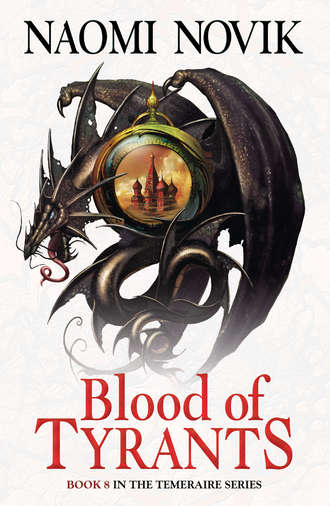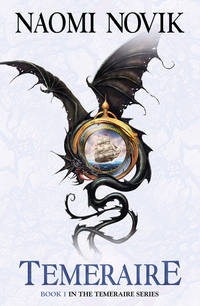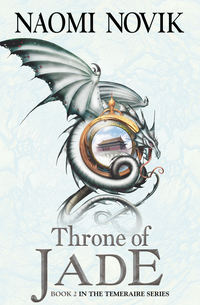
Полная версия
Blood of Tyrants
“Whatever do you mean?” Temeraire said, peering down.
“They have loaded up those boats there with tinder,” Granby answered him, shading his eyes to peer at the shore. “They may come out and have a go at setting us afire, we think.”
“What?” Iskierka said, rearing up her head abruptly, her eyes going very wide. “What? How dare they! I will go and fire them, at once!”
“Oh, no, you shan’t,” Granby said firmly. “Not until we have seen what they mean to do; you cannot blame them for having a lookout, when a transport loaded to the brim comes creeping into their harbor.”
When Hammond had been put back aboard—he was so unhandy about coming up the side that Churki would no longer have it, pronouncing it a ludicrous and unnecessary risk, and insisted on reaching down to lift him up herself out of the launch—he did not say anything at all of Laurence, and nothing to reassure about the egg, either.
“The worst news imaginable,” he said. “I had private conversation of Mr. Doeff, who is the commissioner here, and good God! Do you know a ship called the Phaeton?”
“Lost in the Pacific, two years ago,” Captain Blaise said, automatically.
Laurence had thought well of Blaise—had called him a respectable and a sensible man, but in Temeraire’s private opinion he was only a block: not the least imagination or interest as far as Temeraire had been able to discover in nearly the full year of their acquaintance. He was not afraid of dragons, which was the best Temeraire could say of him, and indeed he made a point of taking the air upon the dragondeck every day—after making a punctilious request of the most senior aviator on deck for the liberty—as a sort of gesture to reassure the hands. But his head was full of nothing but the Naval Chronicle; he had no other conversation but the weather, and that was not very much use as he insisted on always saying the prospect was very fair, even when it was plainly coming on to a three-days’ blow.
“Pellew’s second boy had her, if I recall aright, and she was looking in at the Dutch trade last anyone heard of her,” Blaise added now. “Likely she went down in a gale—” and stopped as Hammond shook his head.
“She was sunk here,” he said, “—here, after coming in under false colors, taking hostage two of the Dutch officials who went out to greet her, and threatening to fire the shipping in the harbor if the Japanese did not supply them. Her captain must have been a lunatic,” he added bitterly.
The uproar this produced, Hammond had evidently not expected. He had meant to convey that the Japanese were not in the least pleased with the British, and that they naturally thought the Potentate had come to make a fuss over the sinking of the Phaeton. In this he had succeeded, but was dismayed to discover that Captain Blaise would have liked to confirm all the worst fears the Japanese might have entertained. When Hammond had finished, Blaise walked to and fro along the deck for an hour altogether in great fury, repeating that it was more than a dog could bear, that they should have sunk a British ship and receive no answer, even in the face of all Hammond’s increasingly anxious remonstrations.
He was only at last persuaded to go inside to write a report of it to the Admiralty; Hammond turned at once to the dragondeck, so he might corner Captain Harcourt, who was senior, and try to make repairs by urgently pressing her in turn to disavow any possibility of action.
“Hammond, I haven’t the least wish to start us another war in some hasty fashion,” she said at last, in some irritation, “but no-one can blame Blaise for being distressed, and I am so myself. It is all very well to say her captain was provoking: whose word do you have for that, but this Dutch fellow, whose trade he would have gone after?”
She walked away from his importunities, and at last Temeraire could pin Hammond down with a clawed foot laid down in his path, when he would have dashed away from the dragondeck at once again. “Oh—no, no, they do not know anything of Laurence,” Hammond said, distracted. “Pray will you move, I must go down and speak with Blaise again—”
“It is just as I thought,” Temeraire said savagely, without giving way, “you have done nothing at all and it was all falsehoods, your promises to look for Laurence: did you even ask them about him? And what is he to do, now, when you tell us they all hate the British here, and he is all alone, and we are hundreds of miles away? I ought have let this wretched ship sink,” he added, “and left you on it.”
“I hope to God I will not wish as much, soon enough!” Hammond cried, taken aback by his violence. “But I have asked, I give you my word, and Mr. Doeff has promised me he should inquire among the Japanese. But you must see under these circumstances I was forced to proceed with the greatest caution. Imagine if they should know his value as a hostage against us? So I have only said we had a shipwreck, and we would be glad to have any news at all of our sailors, if any sign had come up on the shore of any of them. I will bring you any word at once, I assure you: and pray consider that any opening of hostilities between us should certainly make his rescue a thousand times more difficult.”
He added this last urgently, and though of course Temeraire saw straight through this transparent piece of manipulation, he could not argue with it; neither could he do anything, for good or ill, to forward the matter. “Maximus,” he said, feeling quite desperate, when he had let Hammond go dashing away again towards the stern cabin, “I do not suppose you would go and look for Laurence? That sea-dragon cannot come out of the water. If you should keep away from the coast—”
But, “Enough of that,” Churki said, overhearing. “Maximus had much better stay where he is, and you had much better eat another bowl of soup and take your medicine, so that when we do hear some word worth acting upon, you will then be able to do so. Do you suppose Laurence would be grateful if you have made yourself ill or lost one of our company, in the meantime, just to feel as though you were doing something when anyone can see there is nothing sensible to be done?”
This shot went uncomfortably home: Temeraire knew Laurence by no means approved of any rash or hasty action, and had spoken with him on several occasions about the need for sober reflection. “Particularly,” Laurence had said, “when you must know the others will often heed your advice and attend your requests: how much more should that trust increase your obligation to serve them well in such circumstances, by the exercise of restraint? You must be careful not to abuse it, in trying to persuade them into a course against their own interest or that of the nation, for your own benefit.”
And how eagerly Temeraire had agreed with him! He sank his head upon his forelegs. The truth was he did not know where to fly, even if he had been well enough to go himself; and besides that, Maximus was not the fellow anyone would have sent on a search mission. He would have to spend half of every day only hunting, and likely making all the people very angry for the quantity of food which he should be taking from them.
“But I cannot only lie here!” he burst out. “And do not tell me,” he added, “—do not dare to tell me that Laurence is dead, so I might as well do so. If he is dead, then I cannot see any reason I should not go to the devil any way I like.”
The water-dragon’s name was Lady Kiyomizu, although much to Junichiro’s horror she breezily told Laurence to call her Kiyo, and not to stand on formality. “You have no manners anyway,” she said, “and there is no sense your trying to put out sakura blossoms, when you are a bamboo.”
Laurence ruefully swallowed this friendly condemnation as the price of his rudeness: he was more than willing to accept it, in any case, to gain such assistance as she was ready to offer in exchange for the scraps of poetry and drama which he could dredge up out of his memory. Fortunately he had always cultivated literary entertainments on his ships, to improve both the education and conversation of his young gentlemen, and the spirit of his hands. They had only just concluded the performance of A Midsummer Night’s Dream, and on the King’s birthday last, Lieutenant Riley had given the officers a stirring rendition of the St. Crispin’s Day speech, which Laurence did his best to repeat now. Fortunately his cabin abutted Riley’s, and so he had heard the speech said over and over in the evenings for nearly a month beforehand.
“But I beg you will pardon me if you later learn I have mistaken any of the phrases,” he said. “I have not heard it since—” and stopped, for of course, he had not heard it in eight years gone and more.
Indeed the Reliant herself was surely no longer his at all. It would have been a peculiar career which after such a period should have left him in a prime frigate, and yet not seen him advanced to the command of a ship-of-the-line. Either an unlikely disgrace or promotion must inevitably have been his lot—and then he wondered suddenly if the transport herself was his, something in between the two.
He found it hard to sleep that night, searching for some scrap of memory to be a rope-line which he might have climbed to get a look at himself, past horizons which seemed empty all around. But nothing came to hand, and he felt ever more strongly the anxious sense of something lost; he put his hand into the bundle beneath his head and closed it around the hilt of the sword, the ray-skin familiar and not at once. He slept at last fitfully, ill-at-ease, and startled awake when footsteps came into the temple: an old woman carrying a steaming pot, and she screamed when she saw his face and dropped it, fleeing into the early dawn.
“Why, that is a pity,” Kiyo said, yawning tremendously: she seemed able to almost open her jaws in a straight line. “You have made her spill half the sake. Pour the rest in the bowl! It is a little early, but the morning is nice and wet. I do not mind getting up.”
She put them on her back again, when they had eaten the rest of the rice dish, and she had drunk the rest of the wine, and she tramped down the hill through a faint cold drizzle towards the river. “Put the baskets on,” she said, stopping on the shore, “and let us get under way! It’s a long way to Ariake, and we will have to stop and get something to eat along the way.”
There was a sort of harness resting upside-down underneath a little lean-to by the shore: two tightly woven baskets, watertight, lined thickly with straw and a final lining of fabric. These were joined to each other with straps which went about her body; each was big enough for a man to climb inside, and when Laurence and Junichiro had strapped it upon her and ensconced themselves so, Kiyo plunged into the river and swam out into the deep part of the current, very like a horse bearing saddlebags.
Almost directly they had left the curve of the river leading to the temple, they were in settled countryside: women and children on the banks, washing clothing and carrying water, waved to them with enthusiasm as they passed, and fishermen poled small vessels out of their way, yielding precedence. Laurence had bundled his hair beneath a scrap of his old shirt, and he hunched his shoulders and looked down as they sailed onwards to avoid any comment on his features: he was increasingly conscious that any journey overland would have offered scarcely any hope of success.
Junichiro for his part also kept his head down; from what Laurence could see of his expressions, he seemed to be caught in a confused welter of pleasure and misery. His delight in the dragon’s company, and in the condescension she had shown them, was very plain; it was equally plain he did not feel himself deserving of it, and Laurence would not have been surprised to have him burst out in confession of his crime at the least encouragement.
Fortunately this was not immediately forthcoming. The two of them might have been traveling alone, for Kiyo’s head was nearly always submerged beneath the surface as she carried on against the current, her long tendrils streaming away to either side around her like trailers of seaweed caught on a ship’s hull. Her speed was indeed remarkable: better than six knots, Laurence judged.
“Will you tell me about the course we are on?” Laurence asked Junichiro, when they were on an isolate curve of the river, hoping as much to distract him as to learn more of his circumstances: they seemed to have been swept up beyond his control for the moment.
“You must have done something notable in a past life,” Junichiro said, half to himself, as though trying to explain to his own satisfaction what had brought them so much undeservedly good fortune. Laurence, for his part, should have liked to know what he had done either evil or good so as to produce all the ills of his present situation, but as he did not accept Junichiro’s explanation, he could only attribute it to some forgotten act of his lost eight years. “And we are on the Chikugo River, following it to the Ariake Sea,” Junichiro added. “That is between Chikugo Province and Hizen Province—”
“Hold, you leap too far ahead,” Laurence said, and made Junichiro explain a little more of the geography of the nation, a small country like his own; they were upon the island of Kyushu, which after a little description Laurence mentally classed with Scotland: it was not the largest, nor the site of the capital, but the home of considerable wealth and industry; and this divided into several provinces.
“Nagasaki is in Hizen Province, on the western side of Kyushu—and Hizen is on the Ariake Sea, like Chikugo, so it will be much easier to get to there,” Junichiro added, and with a finger dipped in river water sketched him a very rough shape on the dry part of the dragon’s back, which shortly evaporated but left Laurence with the comfort, not inconsiderable for a man who was used to knowing his precise latitude and longitude at nearly every moment, of having some approximation of his bearings.
Junichiro said it should require the entire course of the day, to see them to the shore of the inland sea; Laurence settled himself low in his basket and prepared only to wait: the rocking motion of their journey was familiar, and he was ready to yield himself to sleep when cries from the bank started him up. He looked and saw a small crowd of people urgently waving a banner bearing several large-painted characters in red, which they had been in the process of rigging out on the riverbank from a signpost.
“Oh,” Junichiro said, taken aback, and Laurence, looking over, wondered if this were to their account—couriers, he supposed, might have carried around a warning to be posted to try to capture them. But after a brief hesitation, Junichiro reached down into the water and tugged on one of Kiyo’s tendrils.
Her head burst from the surface, rivulets streaming away, and the people on the riverbank renewed all their clamor; she did not hesitate for an instant herself, but immediately shifted her course out of the river’s current towards them, and as they neared Laurence could see the chief of the delegation, as he supposed, bowing deeply before they had even come to shore.
Kiyo climbed out partway onto the shore to speak with this man, balancing herself on forelegs in a pose reminiscent of the great sea-dragon which Laurence had seen. The conversation, naturally, proceeded entirely in Japanese. Laurence crouched in his basket and tried as best he could to avoid any notice, which effort met with success only because no-one present showed the least interest in Junichiro or himself; all their attention was fixed on the dragon.
It struck him abruptly that Kiyo also had no captain, no master; as neither had Lady Arikawa nor Lord Jinai, nor even the light-weight who had ferried about the magistrate and his servants. Laurence was startled, and startled even more that he had not even noticed it before this moment; he had thought nothing of it at all.
It ought to have been certain proof of an untamed ferocity. Dragons required a captain, harness, crew, all the forms of control, to be tolerated anywhere near settled country, or they would rampage and destroy; any beast not so restrained could only be penned in breeding grounds and bribed with cattle to remain there. So Laurence had always supposed—so he had always known. But even as he articulated to himself this commonplace understanding, it rang false. Proof to the contrary was before him, of course—but that should have seemed peculiar, disconcerting, and did not.
He had not managed to explain it to himself when the discussion concluded and Kiyo turned her head over towards them and said, “Down you get!”
Junichiro obeyed at once, and leapt to unbuckle the baskets; Laurence had scarcely any alternative but to follow his example, and hide his face from the expectant delegation by keeping it turned towards her side. They at least did not immediately seize him. Unburdened, Kiyo plunged back into the river and opened her jaws: she began at once to swell up into that wide immensity which Laurence had witnessed the previous evening. This time when she had reached her full size she did not bring the water forth again, but swaying and ponderous dragged herself up onto the shore, and in a strangely gargled voice gave direction. The delegation all turned and set out along a track that led away from the river, carrying their banner with them.
“What is happening?” Laurence asked Junichiro quietly, as they trailed in Kiyo’s wake; but he might have reserved his questions. The path turned quickly out of the trees and opened onto a truly splendid wide-open vista: a series of very wide terraces falling away from them down a sloping hillside, each full of water and faintly green with the earliest sprouting of rice plants, though surely the season was too early. There was yet a sharp chill of frost in the air, which Laurence thought must be inimical to any farming, although only to be expected at this time of year.
At the summit stood a great stone basin with a wide irrigation channel running away from it down the hill: peering over, Laurence could see more channels leading to either side into each terrace. The delegation here broke up, and most of the number went running swiftly down narrow pathways along the hillside, calling notice: workers in the fields, who were mostly busy staggering under yokes of water-buckets, raised their heads from beneath wide-brimmed hats and, seeing the dragon, hurried to take themselves out of the terraces until they were lining the hillside paths.
From a village visible at the base of the hill, a neat hamlet of thatch-roofed houses, more people were streaming to join the welcoming party, children running with a cheerful clamoring; more banners were being carried out of a larger house, perhaps ceremonial, and set at the foot of the hill in bright array.
Kiyo was leaning forward into the basin and dipping her face into it, shaking her head so the tendrils made a great cloud around her. Laurence could hear a peculiar gurgling and hissing from her side, an internal noise like a man digesting an excessive meal. She raised her head up and shook off the droplets, and then nodded to the anxiously waiting delegation. Two of the great banners had by now reached the summit and were fixed to either side of the basin, cracking in the wind. All were standing silent, in attitudes of tense expectation.
Kiyo adjusted her position, and then she opened her jaws wide and began to expel the water into the basin: not in any massive quantity at first, a thin stream like the jet of a small fountain, but Laurence was astonished to see the water so hot that it was steaming in the open air. Shortly the rime of white ice, half-an-inch wide, which edged the pool in the stone basin had melted entirely away, and water was running softly away down the channels. Kiyo paused in her work and put her face into the basin again—perhaps working out in some way the desirable degree of heat—and then she sat up again and began once more, in earnest.
The gush of water came out of her jaws as from a kettle, steaming-hot, and went running down to water all the fields—likely saving them from that very frost which Laurence had noticed. As he watched the process, he realized that the Japanese might well receive from this influence an entirely additional growing-season: if they might rely on such a rescue, when a frost threatened the crop, they might begin the first planting earlier, and take the second harvest later, and get two crops instead of one. Their urgency was easily explained, now; having drawn the attentions of a water-dragon so soon likely had saved more of the crop.
When Kiyo had reduced herself back to her original dimensions and closed her jaws again, and the men along the hillside had tried each shallow terrace and waved one after another their banners in signal of success, the general relief was nearly palpable. More bowing and ceremonial thanks ensued, and though there were no effusions, no broad beaming expressions, even so shoulders had straightened; anxiety had lifted. Laurence could not fail to interest himself in proceedings so foreign to his experience, and yet so familiar: he had ridden the estate with his father on occasion as a boy, and there was not so great a difference between the expressions of the tenants receiving relief in the case of some disaster to their crops or homes, and the present—though his father had not nearly so dramatic a support to offer.
Nor so general: the entire village had benefited, here, and it was at once apparent they meant to show their appreciation in proper form: an ox was led up the hill, lowing in anxiety as it came nearer the dragon, and was shortly butchered before them. The tender offal was flung immediately into a hot pan over coals: sweetbreads and heart and liver and brains, and these having been quickly seared were presented to Kiyo, who devoured them delicately while the great sides of beef were carried away to prepare some more elaborate offering. Other preparations were already in train—cooking-steam was issuing from many of the houses below and baskets of cooked rice beginning to emerge; the leaders of the delegation were seating themselves formally on mats placed around Kiyo’s head.
“Well, we will be a little late getting you to the sea,” she said cheerfully, looking around to Laurence at last, as she settled herself down to eat, “but at least we do not need to worry about eating. How delicious good, fresh beef is!”
The remark fell, unfortunate, loud. Whether they merely had more leisure now for interest, or her addressing him drew attention, several heads turned: the village chief, some other of the older men and women, and Laurence found himself regarded with dawning astonishment, in a widening circle of silence.
Chapter 5
Temeraire’s spirits had been equal to the challenge of thinking Laurence swept overboard and flung onto the shore, even in the face of general doubt and disagreement; but he began to find it difficult to sustain his confidence, knowing Laurence in such dreadful circumstances: not merely a shipwreck in a strange country, alone, but with every hand against him—every man his enemy, every dragon.
Temeraire could not bring himself to choke down more than a few swallows of soup and rice to share room in his belly with the lump of anxiety, nor could he take any pleasure even in the egg, though Granby and Roland had spoken to him several times that afternoon, anxiously, and remarked upon how nicely it came along. Ferris also had complimented it, very prettily, while Forthing scowled at him and then only stammered out his own attempt—which no-one wanted, anyway; but in neither case could Temeraire raise much of either satisfaction or irritation. He lay unhappy upon the dragondeck, watching the harbor traffic more from a dull consciousness of duty than from any real interest.
The Japanese boats which crowded the harbor, though not large, were well-handled: fishermen and porters and barges. Besides these and the Chinese ships, the Dutch ship stood out in the harbor: a clipper, with a long and narrow draught for her three masts; she would be a fast sailor, Temeraire thought vaguely. He did not much care about her; she was no danger, as she was all alone, and would scarcely have made a threat to the Potentate even without aerial support. He could not see that she had any guns at all.






